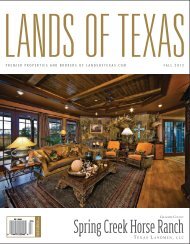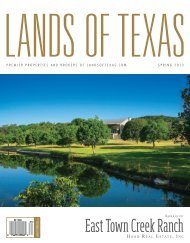•Spring 2017
•Spring 2017
•Spring 2017
Create successful ePaper yourself
Turn your PDF publications into a flip-book with our unique Google optimized e-Paper software.
LAND / Land News / Market<br />
Utilizing Section 453, there are no 45 and 180 day periods,<br />
there are no loan to value ratios to be concerned about and the<br />
property owner can sell his/her property and buy any property at<br />
any time in the future. Sounds like something Bull would blow his<br />
horn over.<br />
Another situation that we have found with 1031 exchanges occurs<br />
when there are multiple owners and of course, they all want to sell<br />
and do something different. One or more of them wants to defer<br />
taxes utilizing another 1031 and one or more wants to take the<br />
money and run. No problem for us. The sellers that want to take<br />
the money and run can do so and the sellers that want to defer<br />
taxes can do so using our Section 453 tax deferral strategies.<br />
Since I seem to be on a roll, let’s look at some other tax deferral<br />
opportunities that property owners can benefit from by utilizing<br />
Section 453. First, many land owners own property that will<br />
eventually become their retirement plan. At some point in time,<br />
the land owner would like to sell, retire and move closer to their<br />
grandchildren so they can spoil them in an effort to get even with<br />
their kids for being so rotten when they were growing up.<br />
The problem for the land owners to do so could be taxes<br />
when they sell their property. For example, let’s say for sake<br />
of discussion that the property has been in the family for 60+<br />
years and almost all of the sales proceeds will be considered<br />
to be capital gains. When taking into account the 20 percent<br />
capital gains tax, the five to ten percent state tax in 43 states and<br />
depreciation recapture of 25 percent, that could mean a tax rate<br />
of roughly 30 percent on the sales proceeds and that could be<br />
an obstacle to selling the property. Section 453 can defer those<br />
taxes and provide the land owners when they retire with a larger<br />
retirement plan which can be passed on to their heirs if they so<br />
desire. Hide the grandkids!<br />
Many land owners are not aware that they can defer their capital<br />
gains taxes and retire using Section 453, so quite a few land<br />
owners decide to use the stepped up basis to eliminate their<br />
capital gains tax liability. This may be a good strategy but there<br />
are pitfalls here as well.<br />
For example, no one knows how long the stepped up basis will<br />
remain as part of the tax code if Congress decides to take a look<br />
at it. In addition, what will the market value for that property be<br />
at that point in time. It could be double the current market value<br />
or it could be 20 percent less. And maybe most importantly, the<br />
stepped up basis has nothing to do with the federal estate tax if<br />
it’s applicable to the situation and can be far more devastating to<br />
the family than avoiding capital gains tax.<br />
Section 453 may be a great option. The land owner can<br />
sell now, defer taxes now, generate about a six percent<br />
appreciation every year into your savings account on the sales<br />
proceeds and there may be estate planning opportunities for<br />
the families as well. Of course, each situation needs to be<br />
looked at separately but the opportunity may be there.<br />
Another opportunity that may present itself is when<br />
selling a great high end residential property. A 1031 is not<br />
appropriate for a residential property but if the sale of a<br />
great residential property will create a large tax liability, we<br />
may be able to defer the capital gains tax and the state tax<br />
on the sales proceeds.<br />
A lot of US citizens own property in a foreign country. That<br />
property could be a hunting property in South Africa to a<br />
ranch in Argentina to a great fishing property in Norway.<br />
Whenever a US citizen sells a property even in a foreign<br />
country, there is a US capital gains tax to be paid if one is<br />
generated. We can defer those US capital gains tax. So if your<br />
family has owned a castle in Germany on the Rhine River for<br />
the past 400 years,we can defer the US capital gains tax on<br />
that sale. If you own property somewhere in Middle Earth,<br />
good luck!<br />
Although at this moment, no one knows what Congress is<br />
going to do, here is a sobering thought. Grover Norquist of<br />
Americans for Tax Reform believes that it would be a mistake<br />
to make any changes in Section 1031 but he cautions that<br />
Congress is taking a hard look and there could be changes<br />
made and those changes will not be positive for land owners.<br />
One of my current concerns is that no one seems to have any<br />
ideas what to do if Section 1031 is dramatically changed or<br />
repealed. The big qualified intermediaries seem to have no<br />
Plan B if this happens.<br />
I am not one to toot my own horn but maybe Bull will toot his<br />
for me. I hope that Congress has the good sense to leave<br />
1031 exchanges alone but if not and even if they do, Section<br />
453 provides much needed flexibility for the land owner.<br />
Maybe its time you get to determine how you will sell your<br />
property instead of having to jump through IRS hoops.<br />
Now go sell a great property and do it your way. Keep those<br />
taxes in your pocket for the benefit of you and your family and<br />
not give them to some member of Congress who will send<br />
your tax dollars to his district for a useless pork project and I<br />
don’t mean buying some hogs. °<br />
LAND.COM • LEGENDARY LIVING<br />
157


















